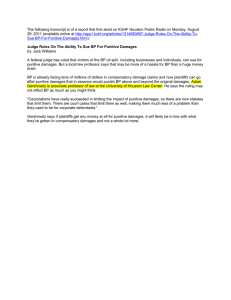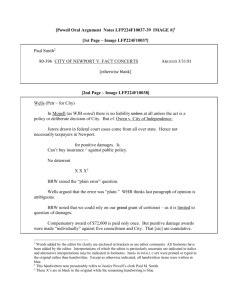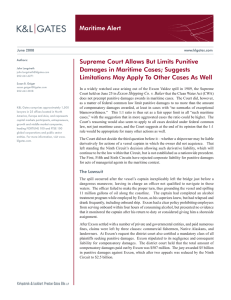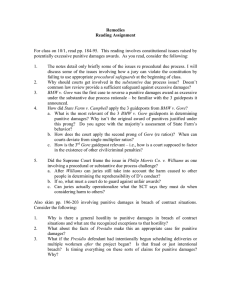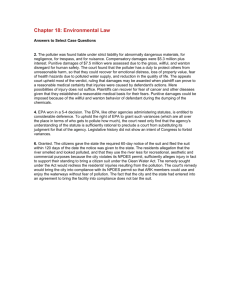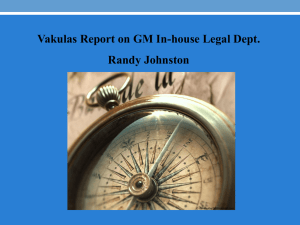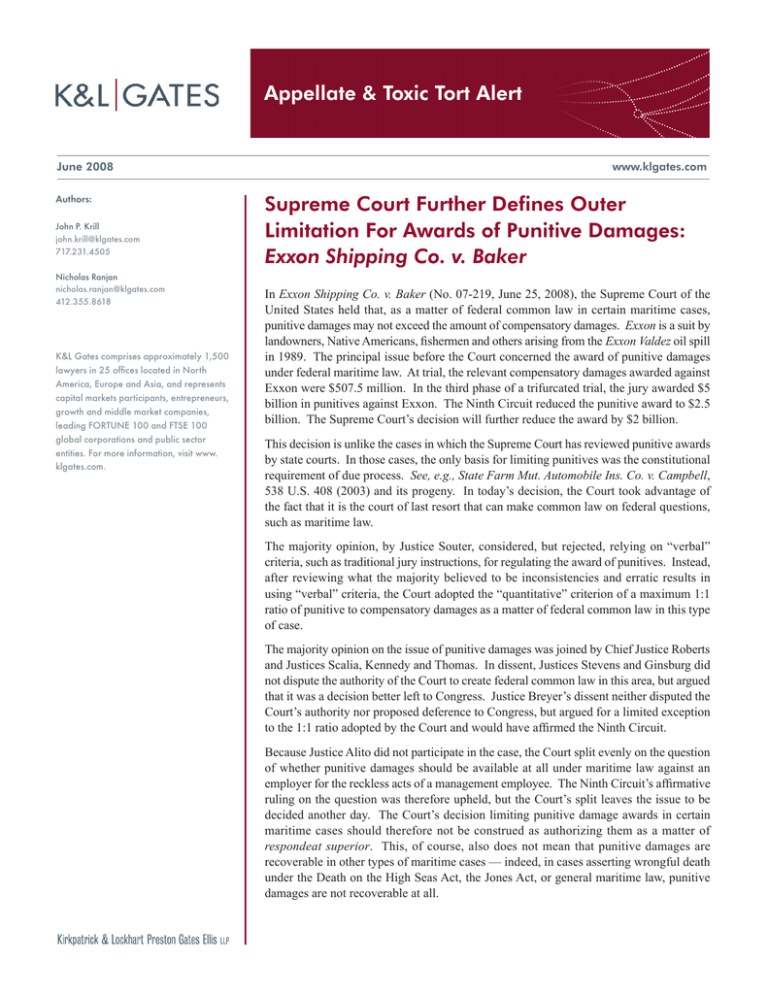
Appellate & Toxic Tort Alert
June 2008
Authors:
John P. Krill
john.krill@klgates.com
717.231.4505
Nicholas Ranjan
nicholas.ranjan@klgates.com
412.355.8618
K&L Gates comprises approximately 1,500
lawyers in 25 offices located in North
America, Europe and Asia, and represents
capital markets participants, entrepreneurs,
growth and middle market companies,
leading FORTUNE 100 and FTSE 100
global corporations and public sector
entities. For more information, visit www.
klgates.com.
www.klgates.com
Supreme Court Further Defines Outer
Limitation For Awards of Punitive Damages:
Exxon Shipping Co. v. Baker
In Exxon Shipping Co. v. Baker (No. 07-219, June 25, 2008), the Supreme Court of the
United States held that, as a matter of federal common law in certain maritime cases,
punitive damages may not exceed the amount of compensatory damages. Exxon is a suit by
landowners, Native Americans, fishermen and others arising from the Exxon Valdez oil spill
in 1989. The principal issue before the Court concerned the award of punitive damages
under federal maritime law. At trial, the relevant compensatory damages awarded against
Exxon were $507.5 million. In the third phase of a trifurcated trial, the jury awarded $5
billion in punitives against Exxon. The Ninth Circuit reduced the punitive award to $2.5
billion. The Supreme Court’s decision will further reduce the award by $2 billion.
This decision is unlike the cases in which the Supreme Court has reviewed punitive awards
by state courts. In those cases, the only basis for limiting punitives was the constitutional
requirement of due process. See, e.g., State Farm Mut. Automobile Ins. Co. v. Campbell,
538 U.S. 408 (2003) and its progeny. In today’s decision, the Court took advantage of
the fact that it is the court of last resort that can make common law on federal questions,
such as maritime law.
The majority opinion, by Justice Souter, considered, but rejected, relying on “verbal”
criteria, such as traditional jury instructions, for regulating the award of punitives. Instead,
after reviewing what the majority believed to be inconsistencies and erratic results in
using “verbal” criteria, the Court adopted the “quantitative” criterion of a maximum 1:1
ratio of punitive to compensatory damages as a matter of federal common law in this type
of case.
The majority opinion on the issue of punitive damages was joined by Chief Justice Roberts
and Justices Scalia, Kennedy and Thomas. In dissent, Justices Stevens and Ginsburg did
not dispute the authority of the Court to create federal common law in this area, but argued
that it was a decision better left to Congress. Justice Breyer’s dissent neither disputed the
Court’s authority nor proposed deference to Congress, but argued for a limited exception
to the 1:1 ratio adopted by the Court and would have affirmed the Ninth Circuit.
Because Justice Alito did not participate in the case, the Court split evenly on the question
of whether punitive damages should be available at all under maritime law against an
employer for the reckless acts of a management employee. The Ninth Circuit’s affirmative
ruling on the question was therefore upheld, but the Court’s split leaves the issue to be
decided another day. The Court’s decision limiting punitive damage awards in certain
maritime cases should therefore not be construed as authorizing them as a matter of
respondeat superior. This, of course, also does not mean that punitive damages are
recoverable in other types of maritime cases — indeed, in cases asserting wrongful death
under the Death on the High Seas Act, the Jones Act, or general maritime law, punitive
damages are not recoverable at all.
Appellate and Toxic Tort Alert
Defendants exposed to punitive damages claims under
state law can be expected to use the Supreme Court’s
decision to seek to limit that exposure, insofar as Exxon
further articulates the concept of an “outer limit” for
awards of punitive damages.Isn’t this dependent clause
a separate thought and possibly unnecessary here?
Although Exxon, as federal common law, is not binding
on state-law issues, it may be given weight by state
courts in considering whether punitive damages are
excessive in light of the evidence. Defendants will
likely argue that Exxon provides lower courts with
authority for the proposition that remittitur to a 1:1
ratio or less should be sufficient to satisfy the deterrent
factor justifying a punitive award.
The Exxon decision may also be used to reinforce a
defendant’s challenge to an award of punitive damages
on constitutional due process grounds. In State Farm,
the Supreme Court previously recognized that “[w]hen
compensatory damages are substantial, then a lesser
ratio, perhaps equal to compensatory damages, can
reach the outermost limit of the due process guarantee.”
The Court in Exxon, comporting its common law
standard under maritime law with the constitutional
standard under State Farm, further explained that
the concept of “substantial” compensatory damages
“takes into account the role of punitive damages to
induce legal action when pure compensation may not
be enough to encourage suit.” Exxon thus suggests
the argument that, in state-law cases where the
compensatory damages are high enough to provide
an incentive for a plaintiff to bring suit, a 1:1 ratio
may be the outer constitutional limit for an award of
punitive damages.
Exxon is the latest in a line of significant decisions
from the Supreme Court limiting claims for punitive
damages.
K&L Gates comprises multiple affiliated partnerships: a limited liability partnership with the full name Kirkpatrick & Lockhart Preston Gates Ellis LLP
qualified in Delaware and maintaining offices throughout the U.S., in Berlin, in Beijing (Kirkpatrick & Lockhart Preston Gates Ellis LLP Beijing
Representative Office), and in Shanghai (Kirkpatrick & Lockhart Preston Gates Ellis LLP Shanghai Representative Office); a limited liability partnership
(also named Kirkpatrick & Lockhart Preston Gates Ellis LLP) incorporated in England and maintaining our London and Paris offices; a Taiwan general
partnership (Kirkpatrick & Lockhart Preston Gates Ellis) which practices from our Taipei office; and a Hong Kong general partnership (Kirkpatrick &
Lockhart Preston Gates Ellis, Solicitors) which practices from our Hong Kong office. K&L Gates maintains appropriate registrations in the jurisdictions
in which its offices are located. A list of the partners in each entity is available for inspection at any K&L Gates office.
This publication/newsletter is for informational purposes and does not contain or convey legal advice. The information herein should not be used or
relied upon in regard to any particular facts or circumstances without first consulting a lawyer.
Data Protection Act 1998—We may contact you from time to time with information on Kirkpatrick & Lockhart Preston Gates Ellis LLP seminars and
with our regular newsletters, which may be of interest to you. We will not provide your details to any third parties. Please e-mail london@klgates.com
if you would prefer not to receive this information.
©1996-2008 Kirkpatrick & Lockhart Preston Gates Ellis LLP. All Rights Reserved.
June 2008 | 2

